In this piece, we explore the nature and meaning of favelas in Brazil and the ethics of favela tours. Through conversations with residents and community leaders in Vidigal favela in Rio de Janeiro, we consider how community-driven favela tour experiences can create positive social impact and reduce the exclusion and separative otherness of marginalized communities.
“I used to see guides from other places taking travelers around the favela,” Russo, our local guide, said as he began his story at the entrance to Vidigal favela.
“What are they saying about my community if they don’t actually live here? I thought I could be a better guide. This favela is my home. I’ve spent my whole life here.”
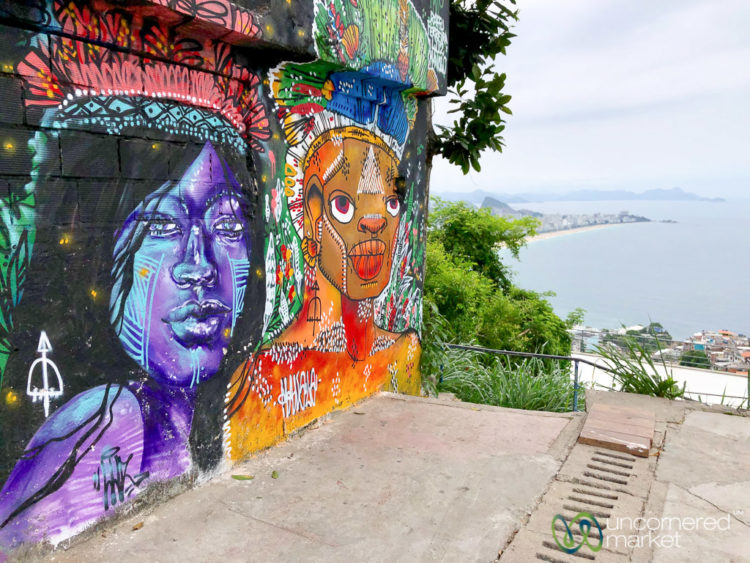
We kicked off our recent trip to Brazil somewhat unconventionally with a visit to Vidigal, a favela in Rio de Janeiro. When people hear the term favela, their minds can run exclusively to poverty, gangs, drugs and violence. However, during our Vidigal favela tour with Planeterra Foundation and their local partner Favela Experience, we encountered a more complex story.
We met with community organizations and micro-enterprises that serve as the center point of cultural exchange and engagement for visiting travelers. Together, they create experiences based on local culture, stories, and people. The genesis is deliberately local. So too is the conclusion — with economic and social benefits intended to register first and foremost in the community.
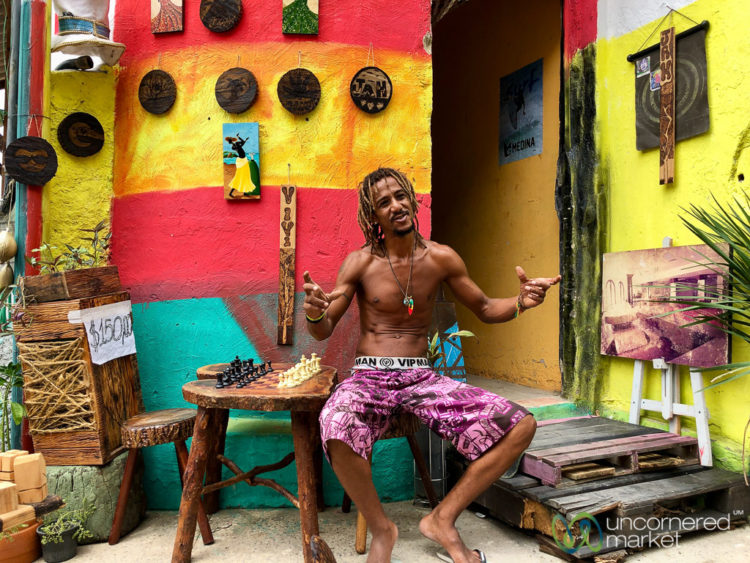 Rasta, no fan of waste, upcycles trash into art on the streets of Vidigal.
Rasta, no fan of waste, upcycles trash into art on the streets of Vidigal.Before we discuss our encounters with residents and leaders of the favela, let’s talk about what a favela is, the ethics of favela tours for travelers, and what to look for when choosing a respectful and responsible favela tour.
What is a Favela?
Favela is Brazilian Portuguese term literally meaning “little bean” and roughly equating to “shanty town” or “slum.” It’s basically an informal district whose residents have often built their homes in the outskirts of major cities — usually in areas like hillsides — where land was once considered uninhabitable by urban developers.
The first favelas in Rio de Janeiro date back to the late 19th century. After emancipation, freed slaves were driven into the hills because they couldn’t afford to live within city limits. These marginalized informal communities then grew through waves of internal migration (e.g., from other parts of Brazil to cities like Rio de Janeiro and Saõ Paulo), especially during times of economic hardship. A story familiar and universal: people fleeing difficulty at home seek a new life and economic opportunity in the city.
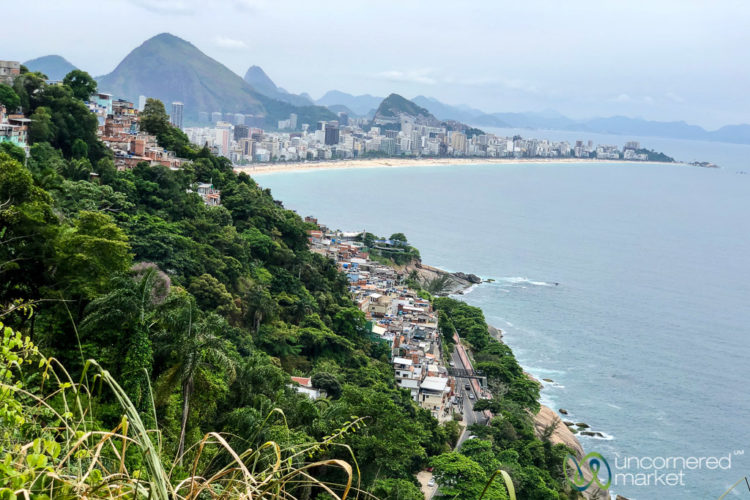
Over time, these once informal settlements became permanent. Shops, restaurants and other businesses emerged to serve local residents. Despite this development, favelas usually remained cut off from most or all government services. Economic opportunities in reality were limited, too, particularly when Brazil’s population took off in the 1950s and everyone looked to cities for economic salvation.
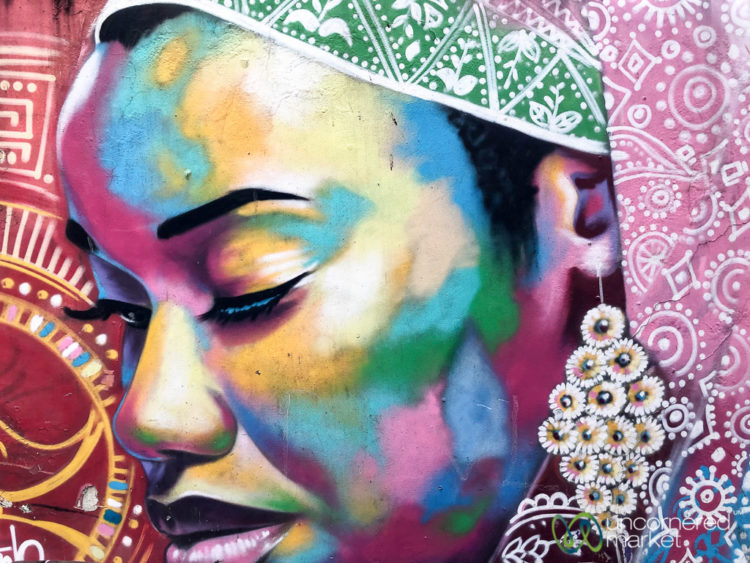 Beauty and creativity on display, Vidigal street art.
Beauty and creativity on display, Vidigal street art.Hence, the rise of drug trafficking in the favelas and the corresponding reputation of them as centers of violence and poverty. The temptation from a distance to generalize all favelas as slums — “they’re all the same” — is reductive and often inaccurate.
“I want to demystify the favela,” Russo said. “Yes, there are bad things here. But there are more good things.”
When windows open onto neighborhoods once considered off limits, there’s an opportunity to shift perceptions from objectified narratives of poverty and danger to the humanized ones of residents making their way.
The Ethics and Evolution of Favela Tourism
If you question the ethics of favela tourism and whether it pedals poverty as an attraction, that’s good. Intent and impact of tourism in marginalized areas demands examination — whether those visits take place in the favelas of Brazil, the townships of South Africa, or the slums of major cities in India.
To this point, we asked a few locals in Vidigal what they thought about tours in their neighborhood.
The community representatives we spoke to are generally in favor of developing tourism in their favela. Their support is qualified, however. Tours and tourism must be developed from and by the community — as in local people creating experiences based on local culture and history, and delivering it all under a premise of cultural exchange. The money must stay local, too. Benefit must be accrued throughout the community.
A fair expectation, no?
Unfortunately, most favela tours to date have not unfolded in this way. The first wave of favela tours included tourists voyeuristically peering and taking photos from tour buses, never exiting the bus. “Too dangerous,” they were told by their tour organizers who’d charge them $150 or more for the privilege and quick thrill.
Favela walking tours were the next step. But the first of those were led by guides outside the community. Communities saw little benefit. Tour fees and money exited right back out to the tour companies.
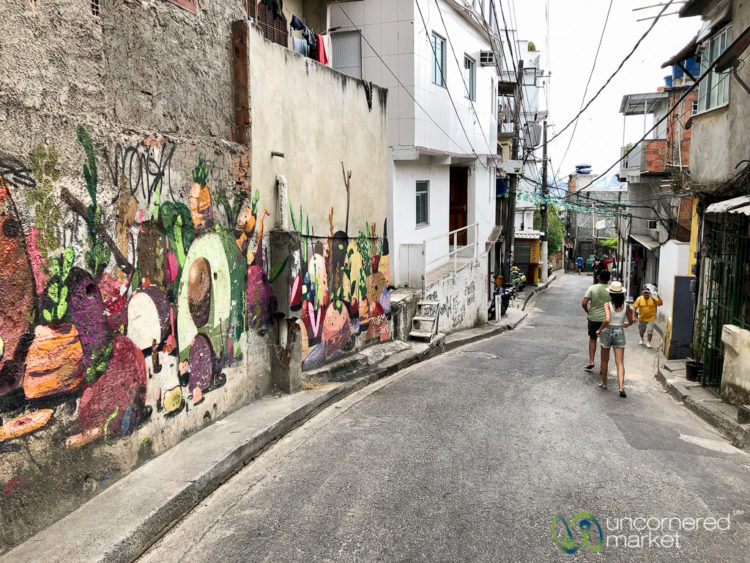 Walking the steep streets of Vidigal Favela.
Walking the steep streets of Vidigal Favela.Favela Tours with Social Impact: A New Model
Community-initiated favela experiences defined by and led by residents represent the next evolutionary step in favela tourism. When given the opportunity, local people are proud to show what is different and unique about their communities. That’s our repeated experience, anyhow.
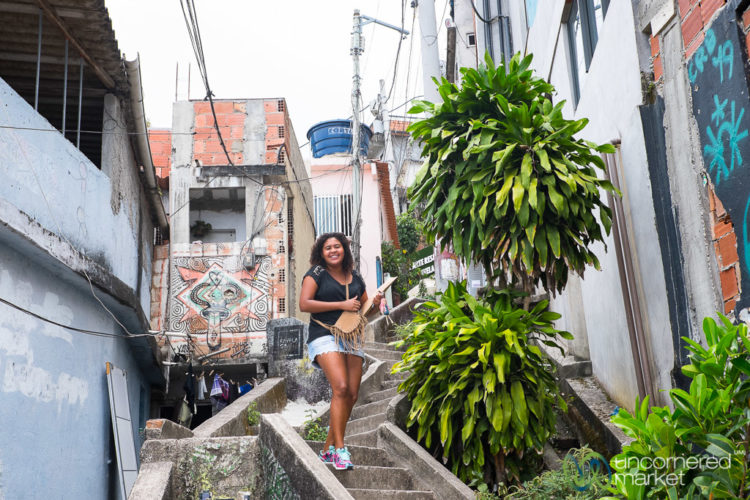
Planeterra Foundation partners with Favela Experience and Favela Inc, a social impact incubator in the favela, to identify local community organizations and micro-enterprises to form the core of a traveler’s experience in Vidigal. Economic benefit is registered locally. So too is civic and cultural pride.
Interactions and conversations from these experiences will inform and shift your perspective and assumptions, just as they did ours. The result: a slow dissolving of the narrative of “otherness,” poverty and danger and its rightful replacement with the story of human beings.
As Russo explained: “None of my TripAdvisor reviews from travelers are about poverty. Instead, they are about the culture and smiles and life that they experienced here on my tour. It changed their view of people living in poor situations.”
When a traveler books a G Adventures tour in Brazil that includes the Planeterra Favela Experience in its itinerary, a portion of that tour fee is paid to the community partner organization as the lead supplier of the favela tour. The tour money is then divided further so that each of the community organizations and micro-enterprises involved is fairly compensated for their work in delivering the tour experience. This provides a steady and reliable source of income to the local organizations for employment and investment.
Furthermore, a portion of tour fees is invested in training, capacity building and support for new and interested community organizations and micro-enterprises. In this way, tour fees contribute to an ongoing cycle of community growth and sustainability.
Faces of the Favela: The People and Community Organizations We Met
The people we encountered were crucial to our expanded understanding of life in the favela. Together with their organizations and micro-enterprises, they form the network backbone of each Planeterra Favela Experience. For the traveler, they also communicate a kind of living history.
Russo and Vidigal Trilhas
Russo swept his hand across the only entrance and exit from Vidigal, a neighborhood with an official census population of 12,000 whose actual population runs nearly three times that. The neighborhood homescape ranges from modest finished buildings to others in states of mid-construction with unfinished floors, exposed brick and rebar.
Russo shared his story of growing up and spending his whole life in the favela — from a childhood in a simple wooden house at the top of the hill to working in a local shop for much of his early adult life. His stories wend their way through the early days of dirt roads to the paved streets coursing the favela today.
That our experience began with and was framed by Russo seemed appropriate. He was among the first local guides in Vidigal. When he initially noticed guides from outside the community escorting travelers through the favela, he decided, “If they can do it, I can do it too.”
With that idea, he founded Vidigal Trilhas, a local tour company, among the neighborhood’s first.
As he saw it, the experience — for visitors and the community alike — could be improved if locals told the story of their community, rather than to have someone else tell it for them.
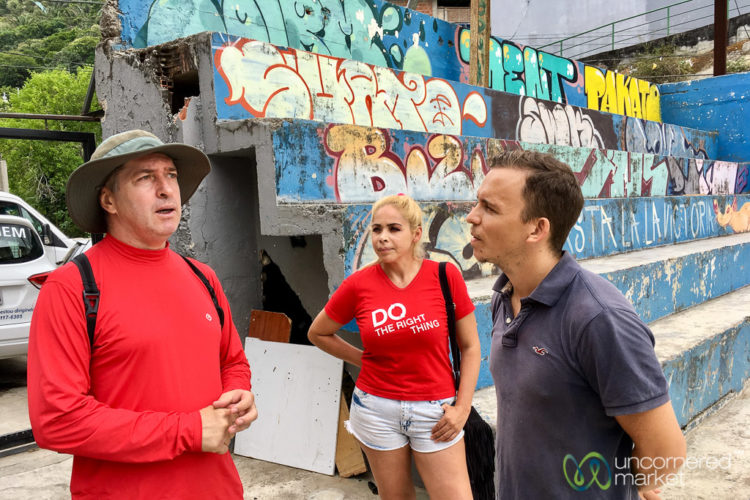
Along our walk, we came to football pitch and practice area for a local percussion group, Batuca Vidi. It was once the territory of a local drug gang. As Russo tells it, he and his friends worked to build the football field because they wanted a place to play. The pitch then fell into disrepair, becoming a drug hangout once again. He and others sought to restore it once more. In a turn of common interest, the gangs supported them and helped clean and rebuild.
As it turns out, many of the drug traffickers had children who needed a place to play, too.
Through community engagement, the neighborhood evolves.
So did what prospective visitors might see and learn.
Isis and Batuca Vidi
Shortly after our tour began, an energetic young woman named Isis appeared, as if out of nowhere. As we discovered from three unexpected encounters with her during our walk, her energy places her everywhere at once despite her busy schedule.
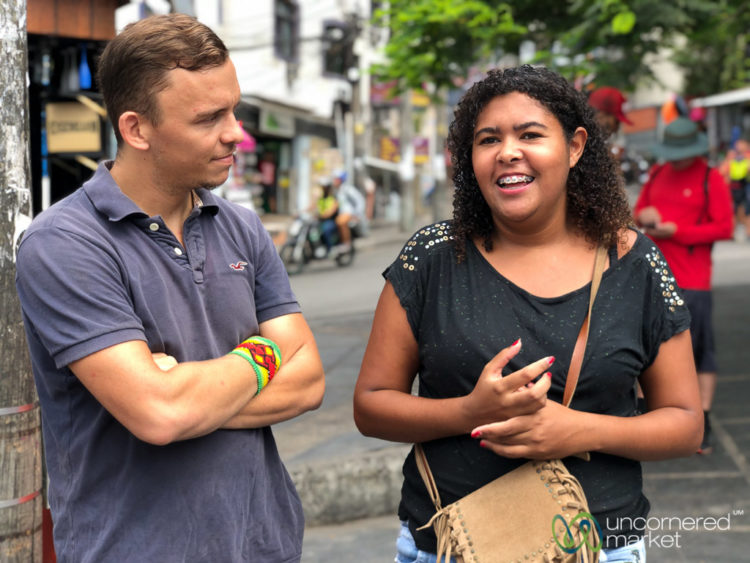
Raised by her grandmother, Isis began playing percussion instruments when she was nine. The most recent chapter of her story begins when, during one of her practice sessions on the street, five local kids approached her and asked, “Can you give us a class?”
Those five kids became her students. Despite having no instruments, they joined her by playing buckets. Interest grew and impromptu drum classes and jam sessions took place in the streets.
Isis later launched Batuca Vidi, a more formal percussion school aimed at teaching school children both music and dance. Batuca Vidi now has over 30 students, ranging from 6 to 17 years old.
With sponsorship from a Brazilian music company they’ve also transitioned to real drums and instruments.
Thanks to her self study of English and the social entrepreneurship training provided to her by Favela Inc, she now finds herself invited to share her organization’s story around the world as she continues to grow it. When we met, she was about to set off for Grenoble, France to advise a local Muslim youth community interested in following a similar model. Later this year, her students will welcome this group from France for an exchange where they will stay and create music in the favela.
When you meet Isis you see a young woman who navigated difficulty to become a community leader. For her, music played a big role in providing opportunity. She wishes to offer a similar path to other favela youth.
Experiences like this reaffirm that positive ideas can travel the world in fascinating ways. And, we all have a little something to teach and to learn from the world we inhabit.
Paulinho and the Sitiê Eco Park (Ecological Park)
Our path continued to the Vidigal Sitiê Eco Park, on the favela’s green edge. When I’d first heard of this favela experience component, my expectations were admittedly low. I was surprised, however — not only by how green and lush this urban forest park was, but also by how much had to be overcome to reclaim the space.
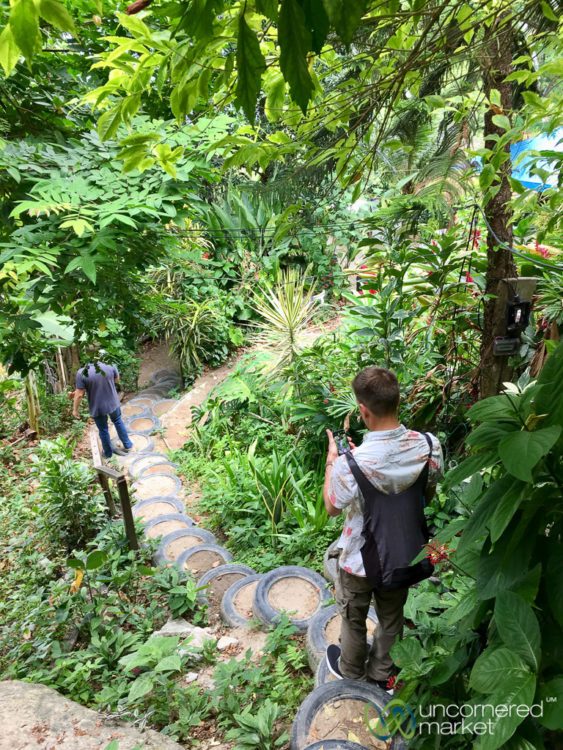
When we met the park steward, a gentle soul named Paulinho, it made perfect sense. He was a positive energy force and a sharer of natural medicine and life wisdom. We learned the story of how he and others removed more than five tons of trash over a three-year period following a 2006 landslide which ran through the area to the main road below, killing several people.
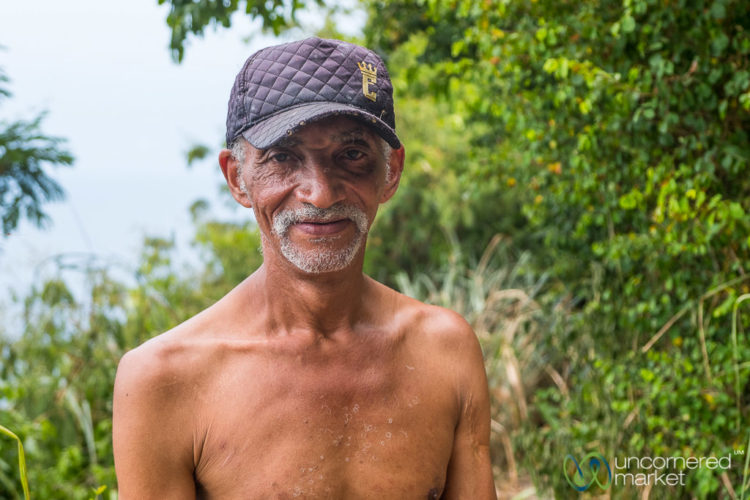 Paulihno, caretaker of Vidigal Ecological Park.
Paulihno, caretaker of Vidigal Ecological Park.As Paulinho walked with us through the park, he treated us to an impromptu natural food and medicine tour featuring samples of tiny local sweet peppers, healing herbs and tasty greens — all of which demanded to someday appear in high-end restaurant salads. He explained the challenge of changing people’s trash dumping behaviors. As he planted fruit trees, vegetables and herbs, he incentivized local people. The deal: don’t throw trash here and you can come to the park for free fruit and vegetables. He was not only able to change behaviors regarding trash disposal, but also around respecting and valuing nature.
Paulihno shared a unique philosophy on the park and its role in the community. To him, the park was a place of positive energy. But, he said, it also drew in the negative energy of broken souls. He found that sometimes the down-and-out are attracted to the park, finding solace there. His role was to create a balance between these energies by helping those in need and perhaps even saving a few lives along the way.
“If you protect nature, nature will protect you,” he said.
Messias and Vidigal Capoeira
We met Messias, a master in capoeira — the Afro-Brazilian martial art that involves music, dance and acrobatics. In a training area fashioned on the top floor of a community municipal building, he explained capoeira and its West African slave origins. Once repressed by various forces in Brazil, capoeira is now a national symbol and is used to export Brazilian culture worldwide. An estimated nine million people around the world still practice it today.
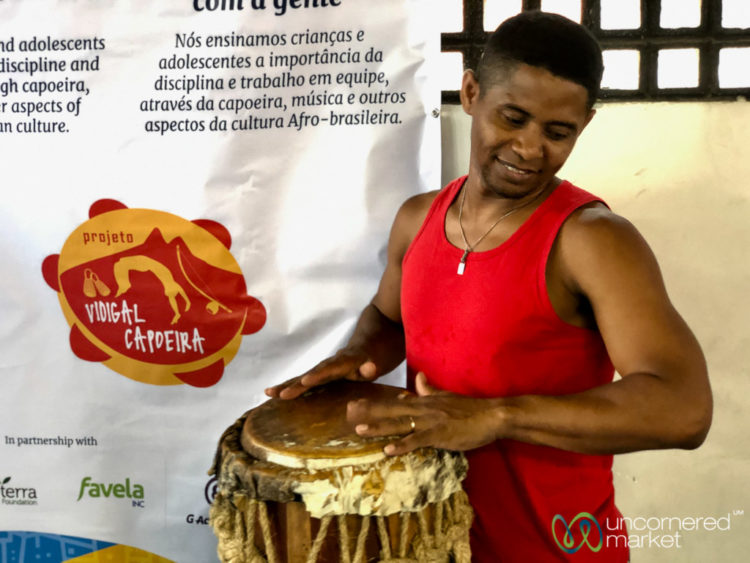 Messias demonstrates some of the music involved in Capoeira.
Messias demonstrates some of the music involved in Capoeira.Messias founded Vidigal Capoeira as a community organization eight years ago. 80 participants, young and old, are involved today.
“In capoeira circle, everyone is the same; there is no social status,” he explained.
His goal is for students to take this philosophy outside of the classroom and into their everyday lives.
During the favela experience, travelers have the opportunity to participate in a capoeira training session led by Massias’ students.
I asked him if engaging with travelers on these tours changed his perspective on capoeira. His response reflected the nature of exchange.
“It’s good for the students. They see firsthand the power of capoeira to bring different people together regardless of country, size or social status.”
Then I asked him what surprised him most.
“They have so many questions for visitors,” he said. “They are curious to know about their countries, where they come from.”
Nilda and Vidigal Beer
After taking in the depth of our favela experience, we landed quite appropriately with a fresh Vidigal Beer on the rooftop of Novo Era co-living workspace, the home of Favela Inc and Favela Experience.
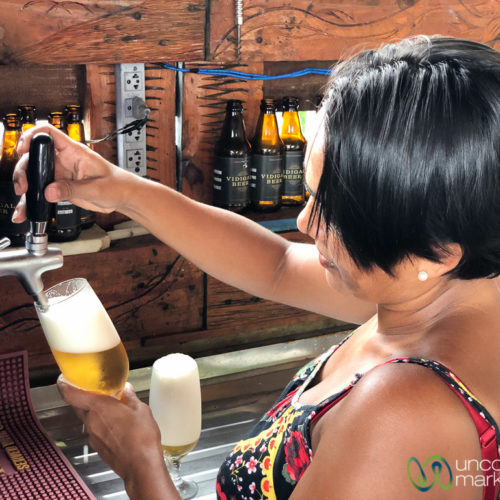
Luciano, the founder of Vidigal Beer, is a self-taught craft beer maker who began experimenting at home, combining traditional brewing techniques with some creative twists inspired from the favela. He and his wife Nilda used the initial investment from the Planeterra project to purchase some new brewing equipment, receive training to professionalize their operations, and to better market the Vidigal Beer brand.
During our visit, we sampled an on-point pilsner, perfect for the Rio summer heat. However, we’ve heard great things about the Vidigal Beer IPA as well. To get a sense of meaning and scale, the micro-brewery currently produces about 50 liters of beer a month, a sufficient volume for its owners to work and provide for their family.
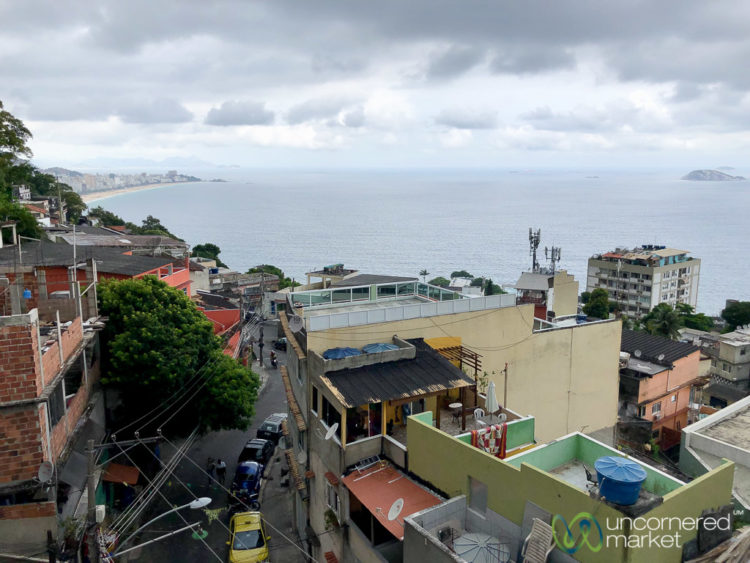 The view from the rooftop of Nova Era to Ipanema Beach and downtown Rio.
The view from the rooftop of Nova Era to Ipanema Beach and downtown Rio.It was a fitting way to end our visit with a sweeping view above the favela. We looked coastward to Ipanema Beach, a scene whose contrasts underscored that — in Rio de Janeiro and the wider world — we are all connected.
Favela Tour Questions You Might Ask
1) What questions should I ask about a favela tour in Brazil?
When you see a favela tour advertised, don’t feel bad about asking hard questions to understand how the tour is organized, who is leading it, and where the money and benefit goes. This will allow you to evaluate whether the favela tour is ethical, respectful and incurs positive impact in the community.
Who created and organizes the tour? Is it driven from the community itself?
Who benefits from the tour? How? Do tour proceeds remain local?
Will I have a local guide? How will I be able to engage with the community and its people?
2) Are Favela Tours Safe?
In general, yes. More and more, community members are aware of tourism and its potential benefits. And when you are guided by someone from the community, it further demonstrates your commitment to contributing positively to that community.
It’s important to note that you may come across drug traffickers, maybe even ones carrying machine guns — graffiti-covered ones, no less — during your experience. It’s important to observe just as we did: they are not concerned with you. Instead, there’s an occasional cat-and-mouse between them and local police who are typically kept at bay with bribes. Admittedly, this encounter placed me outside of my comfort zone and startled me for a very brief moment. However, I never felt threatened.
This is what you learn on your visit.
It’s also important to note that many drug traffickers respect and support social projects. Why? Because their families live in this place. Many of them harbor hope — hope for a future where their nieces and nephews and their own children won’t need to be involved in the drug trade because economic opportunities exist in ways they did not when they were growing up in the favela.
3) Do I need a guide to visit a favela?
While it is possible to walk around these neighborhoods on your own, it’s not something we would recommend. The value and benefit of visiting a favela is not about the voyeurism of sneaking a peek, but about the interaction with local community members in a unique way that only a local guide can facilitate. This type of interaction highlights context and understanding about the history and evolution of a favela neighborhood over the decades, and in particular, how its residents approach life, engagement, and community development today.
A thoughtful favela experience like this places you in conversation with engaging community leaders. They are the pace-setters for the favela community. Most importantly, this is their home.
As always, the thoughts contained herein — the what, the why, and the how — are entirely our own.
The post A Favela Tour in Vidigal, Rio de Janeiro: How to Do One Respectfully and Responsibly appeared first on Uncornered Market.